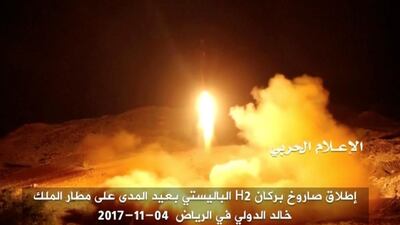A ballistic missile fired by Yemen’s armed Houthi group at Saudi Arabia was shot down on Thursday near the south-western city of Khamis Mushait, the Saudi-owned al-Arabiya channel reported.
It was the second ballistic missile fired from Yemen this month, after an earlier rocket was brought down near King Khaled Airport on the northern outskirts of the capital Riyadh.
The official spokesman of coalition forces "Coalition to Restore Legitimacy in Yemen" Colonel Turki Al-Malki, said that at 8.20pm on Thursday, the Saudi Royal Air Force (RAF) spotted the launch of a ballistic missile from within Yemeni territory towards the Kingdom's territory, reports the Saudi Press Agency.
He said that the missile was heading towards the city of Khamis Mushait and was intercepted and destroyed without any casualties.
Colonel Al-Maliki further said that the control of ballistic weapons by terrorist organizations, including Al-Houthi armed militias represents a threat to regional and international security and that firing them at populated cities is contrary to international humanitarian law.
The coalition asserted that the continuation of armed militias in targeting cities with ballistic missiles is the biggest evidence of the continued smuggling of weapons into Yemen by all ways and means contrary to resolution No. 2216.
Meanwihle, remnants of four ballistic missiles fired into Saudi Arabia by Yemen's Houthi rebels this year appear to have been designed and manufactured by Riyadh's regional rival Iran, a confidential report by United Nations sanctions monitors said, bolstering a push by the United States to punish the Tehran government.
The independent panel of U.N. monitors, in a November 24 report to the Security Council seen by Reuters on Thursday, said it “as yet has no evidence as to the identity of the broker or supplier” of the missiles, which were likely shipped to the Houthis in violation of a targeted U.N. arms embargo imposed in April 2015.
Earlier this month, U.S. Ambassador to the United Nations Nikki Haley accused Iran of supplying Houthi rebels with a missile that was fired into Saudi Arabia in July and called for the United Nations to hold Tehran accountable for violating two U.N. Security Council resolutions.
The report said that monitors had visited two Saudi Arabian military bases to see remnants gathered by authorities from missile attacks on Saudi Arabia on May 19, July 22, July 26 and November 4.
They also visited four “impact points” from the November 4 attack where other remnants of the missiles were identified.
“Design characteristics and dimensions of the components inspected by the panel are consistent with those reported for the Iranian designed and manufactured Qiam-1 missile,” the monitors wrote.
______________
Read more: Arab foreign ministers in London to discuss Yemen humanitarian crisis
______________
The Qiam-1 has a range of almost 500 miles and can carry a 1,400-pound warhead, according to GlobalSecurity.org public policy organisation.
Saudi-led forces, which back the Yemeni government, have fought the Iran-allied Houthis in Yemen’s more than two-year-long civil war. Saudi Arabia’s crown prince has described Iran’s supply of rockets to the Houthis as “direct military aggression” that could be an act of war.
Iran has denied supplying the Houthis with weapons, saying the U.S. and Saudi allegations are “baseless and unfounded.” Iran’s mission to the United Nations did not immediately respond to a request for comment on the U.N. monitors report.
Another ballistic missile was shot down on Thursday near the southwestern Saudi city of Khamis Mushait, the Saudi-owned al-Arabiya channel reported.
The U.N. monitors said they gathered evidence that the missiles were transferred to Yemen in pieces and assembled there by missile engineers with the Houthis and allied forces loyal to Yemen’s former President Ali Abdullah Saleh.
“The panel has not yet seen any evidence of external missile specialists working in Yemen in support of the Houthi-Saleh engineers,” the monitors wrote.
They visited Saudi Arabia after the monitors called on the coalition to provide evidence backing Riyadh’s claim that Iran was supplying missiles to the Houthis, warning that a failure to do so would violate a U.N. resolution.
They said the missiles most likely were smuggled into Yemen along “the land routes from Oman or Ghaydah and Nishtun in al Mahrah governorate (in Yemen) after ship-to-shore transshipment to small dhows, a route that has already seen limited seizures of anti-tank guided weapons.”
The monitors also said that while “concealment in cargo of vessels offloading in the Red Sea ports is unlikely, it cannot be excluded as an option.”
The Saudi-led coalition used the November 4 missile attack to justify strictures against Yemen for several weeks, saying it was needed to stem the flow of arms to the Houthis from Iran.
The United Nations had said the blockade could spark the largest famine the world has seen in decades. Some 7 million people in Yemen are on the brink of famine, and nearly 900,000 have been infected with cholera.
Also on Thursday, three fighters from forces loyal to the former Yemeni president Ali Abdullah Saleh were killed in a second day of clashes with their own allies from the Houthi movement in the capital Sanaa, Saleh’s party said.
A statement from Saleh’s General People’s Congress Party said three guards were killed when Houthi forces attacked the house of Tarek Saleh, Ali Abdullah Saleh’s nephew, adding that they also besieged the residence of Ibrahim Sharaf, a party member and foreign minister of the Sanaa-based government.
“The Houthis violated the truce agreement and attacked the residence of colonel Tarek and killed three guards and wounded three others,” the statement said.

